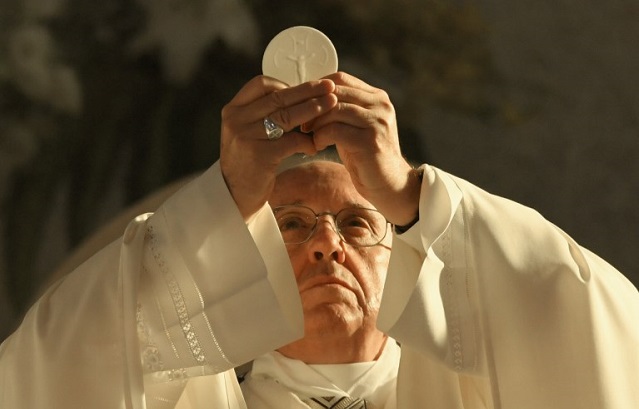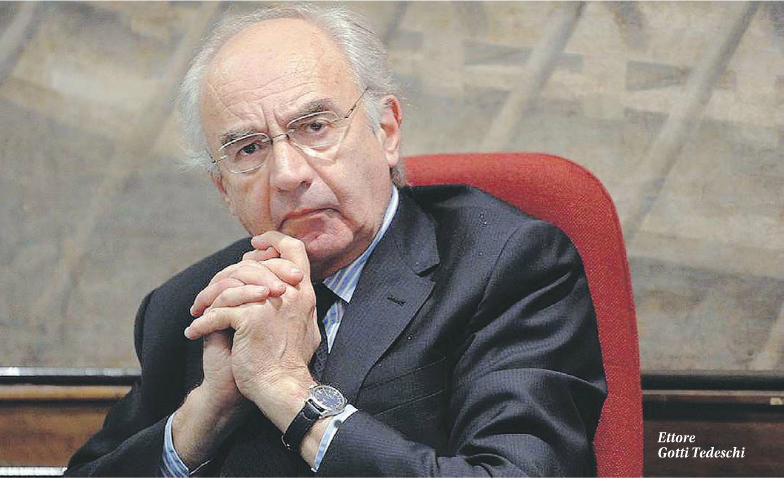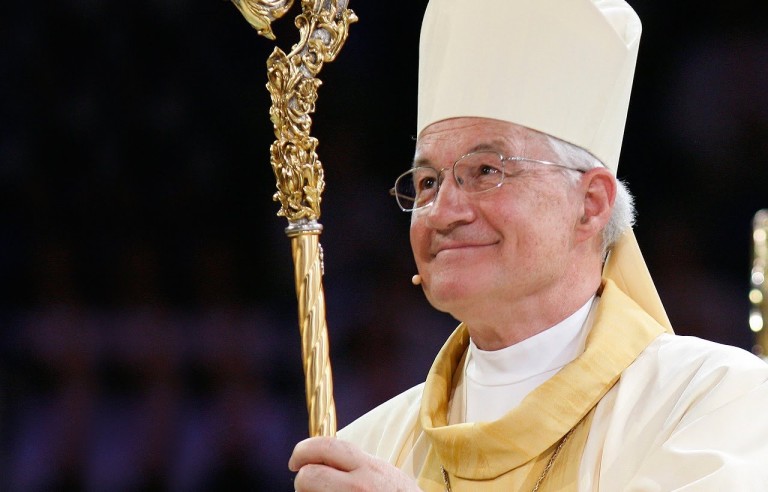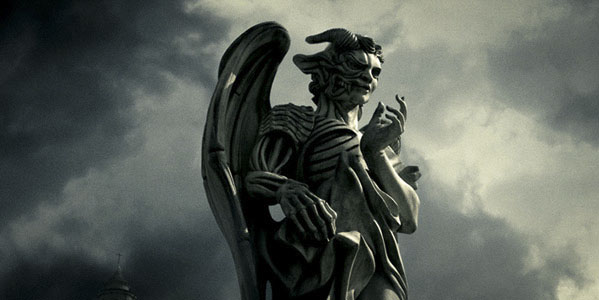
Pope Francis leads a mass during a visit to the Roman Parish of San Pier Damiani, on May 21, 2017 in Rome. / AFP PHOTO / Andreas SOLARO
One of the reasons why I report on a Gnostic website about Catholic news and the Pope is because I grew up Catholic. Another important reason is to document the ancient history and Age old battle between the Catholics and the most famous heretics in the history of the world known simply as the “Gnostics.”
This religious war of knowledge (Greek: Gnosis) has been fought for thousands of years ever since the days of Church Father Irenaeus who had released the first piece of Anti-Gnostic propaganda called “Against Heresies“, or more appropriately, “On the Detection and Overthrow of the So-Called Gnosis.”
It is really a fascinating history that includes some of the biggest players in the world-wide labyrinth that we find ourselves in today. Rulers of the Grand Masonic Chessboard such as the God(s), Kings, knowledge (Gnosis), the priesthood, secret societies, propaganda, war, and Revelations.
A true-life epic that we are witnessing in real time.
What I mean by real time is the fact that Pope Francis has been accused of Heresy in a formal letter called “Filial Correction” by Sixty-two conservative scholars and priests. To put this in historical perspective, they are accusing or should I say condemning the Pope for propagating false doctrines (heresy) just like the Ancient Gnostics were accused of doing.
The letter was prompted by Pope Francis’s April 2016 document known as the ‘Amoris Laetitia’ (Latin: Joy of Love). What is getting these conservative Catholics all riled up with their accusation of heresy in this letter is that the Pope is changing the teachings of the Scripture and the formal legal doctrines of the Catholic Church.
For example, The Joy of Love immediately sparked controversy amongst conservative Catholics because it opened the door to allowing remarried Catholics to receive Communion. Prior to the letter by church decree, the first marriage was invalid and as a result, they cannot receive the sacraments because they are eternally judged by the Church as committing adultery.
Francis begins Amoris Laetitia by noting a division of opinion during the synods in paragraph 3. Pope Francis had said:
“The debates carried on in the media, in certain publications and even among the Church’s ministers, range from an immoderate desire for total change without sufficient reflection or grounding, to an attitude that would solve everything by applying general rules or deriving undue conclusions from particular theological considerations.” He did not propose to resolve those differences by imposing unity: “Unity of teaching and practice is certainly necessary in the Church, but this does not preclude various ways of interpreting some aspects of that teaching or drawing certain consequences from it. This will always be the case as the Spirit guides us towards the entire truth…” (paragraph 3)
This is not the first time that a group of Catholics have felt compelled to write letters. In June 2016, a group of 45 Catholic scholars sent a letter to all the cardinals, asking Pope Francis to repudiate a “number of statements that can be understood in a sense that is contrary to Catholic faith and morals”.
The 62 clergy and lay scholars explain that, as believing and practicing Catholics, they are compelled to address a correction to Your Holiness on account of the propagation of heresies and have the right and duty to issue such a correction to the Pope “by natural law, by the law of Christ, and by the law of the Church” and that the correction in no way undermines Catholic teaching on papal infallibility.
In layman’s words, Francis has officially been labeled or should I say “judged” by fellow Church members as a “Heretic.”
Please keep in mind that these 62 Catholics are not the only Catholics stepping out publically against the Pope. A quick search of the internet reveals a plethora of websites and Youtube videos by self-avowed Catholic heresy hunters and defenders of the pre-Vatican II Council who for the past several years have written articles on various websites and Youtube calling the Pope a heretic. Catholic websites such as AKACatholic.com and Vatican Catholic.com
It has been said that the last time such a letter was issued was to Pope John XXII in 1333 for errors which he later recanted. The letter can be found at this link.
Lifestite news reported, “Rene Henry Gracida, Bishop Emeritus of the Diocese of Corpus Christi, posted a message to his blog on Sunday reproducing an email he sent to the organizers of the “correction,” congratulating them on their actions and asking that his name be added to the ranks of signers.

“I extend my congratulations and gratitude to the originators of the Correction and I wish to have my name added to the list of those individuals who agree with the content of the Correction and want to be identified with it,” Gracida wrote on his blog, Abyssus Abyssum Invocat.
Gracida is also encouraging the Catholic faithful to add their own signatures to a petition supporting the Correction.
Gracida is the first canonically regular bishop in the Catholic Church who has associated himself with the declaration.”
The article further explains Gracida’s position that places these accusations in a similar light to the Ancient Gnostic heresy battle in the beginning of this 6th Age known historically as the “Arian crisis or Arian Controversy.”
Gracida told the Catholic Herald that he hoped “other bishops will sign on to this lay initiative” in order to prompt the Pope to respond.
Bishop Gracida referred to Blessed John Henry Newman’s history of the Arian crisis, which describes how “it was the overwhelming resistance of the laity to the Arian heresy which eventually persuaded the majority of bishops ‘who were either Arian or semi-Arian’ to support the efforts of St Athanasius and the Pope that eventually led to the condemnation of the heresy.”
He said: “At this critical moment in the life of the institutional Church, I do not see how it is possible for anyone who is well-informed regarding the issues that are involved in the controversies surrounding the present pontificate to remain silent.
“While I have every confidence that the Church as the Mystical Body of Christ will survive the present crisis as Our Lord promised Peter, I am not so sanguine about the number of souls that will be lost as a result of it.”
Lifsite news stated, “Until receiving Gracida’s signature, the only bishop to have endorsed the Filial Correction was Bishop Bernard Fellay, the superior general of the Priestly Fraternity of St. Pius X (FSSPX or SSPX). The SSPX is an order of priests that currently has irregular status in the Church, but is in talks with the Vatican. Pope Francis himself has declared that their confessions are valid.”
The Turkey Telegraph reported: “Ettore Gotti Tedeschi, president of former Institute for Religious Affairs (IOR), known as ” Vatican Bank ”, said he saw in statement to La Stampa that he adopted views in the letter but did not sign it as a banker, but as a call made by intellectuals. Noting that his movements were not against Pope, he was a step in loyalty and agenda.

Tedeschi said, “My only intention here is well-being of Church and Pope, and I pray for both.” used expressions.
CruxNow reported that Canadian Cardinal, Marc Ouellet denounced the “alarmist” and “unfaithful” interpretations of Pope Francis’s apostolic exhortation on the family, Amoris Laetitia. They reported:
“The Canadian cardinal, who serves as the Vatican’s prefect of the Congregation for Bishops, told Canadian bishops the document does not signal “changes to doctrine or to sacramental discipline,” but represents a pastoral approach that takes into consideration “the good of the person,” according to his or her circumstances.

“Any alarmist interpretation” that says the document is “a break with tradition,” or a “permissive interpretation that celebrates access to the sacraments” for the divorced and remarried is “unfaithful to the text and to the intentions of the supreme pontiff,” said Ouellet.
Speaking Sept. 25 to more than 80 bishops and eparchs attending the annual plenary of the Canadian Conference of Catholic Bishops, Ouellet said contrasting reactions to the document have been “delighting some, worrying others, leaving none indifferent.”
The former Quebec City cardinal said Chapter 8 of the document is a call for a “new pastoral conversion” that can bring comfort to suffering people. He conceded that although many welcome this approach, others see it as a risk, “a break with the traditional doctrine and discipline” of the Catholic Church. Chapter 8 became the “interpretive key” for the document, making people judge it as either “positive and welcome,” or “ambiguous and risky,” he said.
Amoris Laetitia, the pope’s 2016 apostolic exhortation that followed synods of bishops on the family in 2014 and 2015, “deserves more attention in itself than merely the public debate” around “disputed points,” he said.
Here is the opening statement made in “filial correction” explaining the 62 Catholic’s position as to why they are compelled to address a correction to Your Holiness on account of the propagation of heresies. In other words, why they feel compelled to “correct” the Pope or should we say “judge the Pope”.
The letter opens:
“Most Holy Father,
With profound grief, but moved by fidelity to our Lord Jesus Christ, by love for the Church and for the papacy, and by filial devotion toward yourself, we are compelled to address a correction to Your Holiness on account of the propagation of heresies effected by the apostolic exhortation Amoris laetitia and by other words, deeds and omissions of Your Holiness.
We are permitted to issue this correction by natural law, by the law of Christ, and by the law of the Church, which three things Your Holiness has been appointed by divine providence to guard.
By natural law: for as subjects have by nature a duty to obey their superiors in all lawful things, so they have a right to be governed according to law, and therefore to insist, where need be, that their superiors so govern. By the law of Christ: for His Spirit inspired the apostle Paul to rebuke Peter in public when the latter did not act according to the truth of the gospel (Gal. 2).
St Thomas Aquinas notes that this public rebuke from a subject to a superior was licit on account of the imminent danger of scandal concerning the faith (Summa Theologiae 2a 2ae, 33, 4 ad 2), and ‘the gloss of St Augustine’ adds that on this occasion, “Peter gave an example to superiors, that if at any time they should happen to stray from the straight path, they should not disdain to be reproved by their subjects” (ibid.).
The law of the Church also constrains us, since it states that “Christ’s faithful . . . have the right, indeed at times the duty, in keeping with their knowledge, competence, and position, to manifest to the sacred pastors their views on matters which concern the good of the Church” (Code of Canon Law 212:2-3; Code of Canons of Oriental Churches 15:3).”
As of the publication of this article, the Pope and Vatican have not responded to the letter that was published on the Internet in 6 languages.
What is a heretic?
A “heretic” is someone guilty of a heresy and in line with true Catholic history up into our modern times, espousing heretical ideas and knowledge is not only a sin but a crime. A Catholic crime that has been liable to not only punishments such as excommunication and the death penalty but also a major justification for the Inquisition (Inquisitio Haereticae Pravitatis, Inquiry on Heretical Perversity) and many religious wars.
For example, we can witness a modern Inquisition in real time today with the fanatical Muslims known as ISIS (the Islamic State in Iraq and Syria) who are killing, enslaving, and raping people who they deem as Heretics such as the Christians and ancient Gnostic factions such as the Yezidis.
A religious crime that has seen millions of people tortured and killed since the first Gnostic martyrs were hunted down and later whole countries slaughtered such as the Cathars murdered simply for having knowledge that contradicted “Catholic Church Teachings.”
This is not only a dangerous claim of Heresy made by these 62 so-called Catholics, in the past, it was a death sentence placed upon the accused who were often innocent of their alleged crimes. But as the history of ignorant religious fanatics has proved time and time again, truth and innocence mean nothing when these accusatory religious bloodthirsty parasitic fiends target a “Heretic” in their green midst.
This is how serious these Heretical accusations against the Poper are.
The Codex Justinianus (1:5:12) defines “everyone who is not devoted to the Catholic Church and to our Orthodox holy Faith” a heretic.
According to the Catechism, “heresy is the obstinate post-baptismal denial of some truth which must be believed with divine and Catholic faith, or it is likewise an obstinate doubt concerning the same.” A heretic differs from an “apostate,” who is guilty of “apostasy” (the total repudiation of the Christian faith, not just some part of it), or a “schismatic,” who is guilty of “schism” (separation from the unity of the Church, without necessarily denying some or all of the Christian faith) (CCC 2089).
It is a mortal sin, because it is directly contrary to the theological virtue of faith, “by which we believe in God and believe all that he has said and revealed to us, and that Holy Church proposes for our belief, because he is truth itself” (CCC 1814). It is a canonical crime, because the Church criminalizes certain, very dangerous sins like heresy, so that the Church can compel those who commit them with penalties to carry out the promises of their baptism (Code of Canon Law, Canon 1311). The penalties for the crime of heresy include automatic excommunication (Canon 1364 §1); for clerics, automatic removal from any ecclesiastical office that the heretic might have possessed (Canon 194 §1, no. 2); for religious, automatic expulsion from their religious order (Canon 694, §1, no. 1).
Gratian, the most important medieval canon lawyer, included in his Decretum a warning to errant popes that he attributed to St. Boniface:
If the Pope, remiss in his duties and neglectful of his and his neighbor’s salvation, gets caught up in idle business, and if moreover, by his silence (which actually does more harm to himself and everyone else), he nonetheless leads innumerable hoards of people away from the good with him, he will be beaten for eternity with many blows alongside that very first slave of hell [the Devil]. However, no person can presume to convict him of any transgressions in this matter, because, although the Pope can judge everyone else, no one may judge him, unless he, for whose perpetual stability all the faithful pray as earnestly as they call to mind the fact that, after God, their own salvation depends on his soundness, is found to have strayed from the faith. (Decretum, Part 1, Distinction 40, Chapter 6)

Moe is the founder of GnosticWarrior.com. He is a father, husband, author, martial arts black belt, and an expert in Gnosticism, the occult, and esotericism.


![How Pope Gregory, by letter, exhorted Augustine not to glory in his miracles [601 A.D.] | Book 1 | Chapter 30 How Pope Gregory, by letter, exhorted Augustine not to glory in his miracles [601 A.D.] | Book 1 | Chapter 30](https://www.gnosticwarrior.com/wp-content/plugins/contextual-related-posts/default.png)
